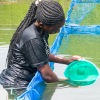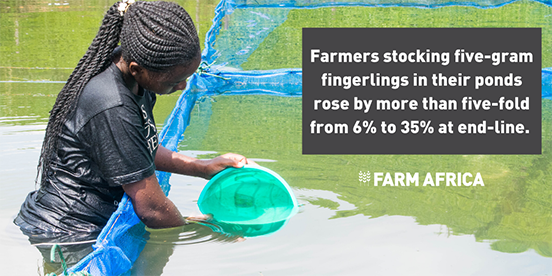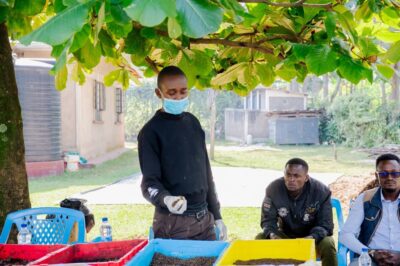News
19 October 2021
Pilot project boosted Kenyan fish farmers’ production and adoption of high-quality inputs

A closing report has highlighted how the Piloting market-led solutions for aquaculture development to smallholders in Kenya initiative, funded by Msingi East Africa and implemented by Farm Africa, has improved fish farming practices, bolstered market linkages and increased farmers’ adoption of quality fish feeds and fingerlings (young fish). The nine-month project focused on developing the technical and business skills of 120 fish farmers.
The pilot tested market-driven solutions to addressing the production and market access constraints faced by smallholder pond farmers in Kisumu, Vihiga and Kakamega counties. In a bid to spur yields, reduce the cost of production and improve profitability by broadening market access, the project established five farmer organisations (clusters) and built their technical and business capacity to develop their aquaculture enterprises.
“These farmer clusters were formed to open up market access for small-scale producers by ensuring a consistent supply of fish to the market through the adoption of synchronised production plans. The clusters also enhanced peer learning and technology uptake which improved the farmers’ businesses,” said Mary Nyale, Programmes Manager at Farm Africa Kenya.

The pilot partnered with three private sector players: Unga Farm Care East Africa, who facilitated access to locally produced quality fish feeds, Tigoi Fish Farm training centre and Pioneer Fish Farm, who produced high quality five-gram fingerlings.
Training sessions illustrating the direct connection between using quality feeds and increased production were backed up by active on-farm extension support provided through youth aquaculture extension agents. As a result, the use of high-quality commercial feeds saw a remarkable upsurge from 35% at the start of project to 86% six months later, toppling the traditional reliance on mash, home-made feeds and other inferior feed types that were predominantly used by the farmers.
Unga Farm Care East Africa’s sales of feeds to the project farmers more than doubled from 21% at baseline to 54% at the end of the pilot, translating to 9.5 metric tonnes of fish feeds sold at a value of Ksh 1,092,500. Unga’s introduction of smaller and more affordable 10-kilogram feed packages further contributed to the improved use of quality feeds since the normal 25-kilogram packages were considered expensive by a majority of the smallholder farmers.
“The Aquaculture Agents have played a crucial role in increasing our sales volumes and offering technical and business support to the farmers. The packaging of feeds into 10-kilogram bags has ensured affordability of the feeds to smallholder farmers whose incomes cannot allow them to buy bigger packages,” said George Kamau, the Unga Farm Care East Africa Technical Representative.

The proportion of farmers stocking five-gram fingerlings rose by more than fivefold from 6% at the start of project to 35% six months later. A total of 35,000 five-gram fingerlings worth Ksh 420,000 were sold by Pioneer Fish Farm from June 2019 to August 2019. This represented a 21% revenue increase from the Ksh 330,000 generated from the sale of fingerlings in the same period in the previous year.
The increased uptake of five-gram fingerlings was catalysed by a cost sharing programme where the cost of purchasing the fingerlings was borne on a 50/50 basis by the project and the farmers respectively. This was further augmented by the linkages created by the Aquaculture Agents resulting in a 30% increase in sales.
The proposition for bigger fingerlings was drawn from a study conducted by Farm Africa and WorldFish in 2018, which found that the use of fingerlings weighing five grams and above reduces the duration of fish farmers’ production cycles by up to two months and also decreases input costs, thus improving farmers’ productivity and profits.

To open up access to markets, the Msingi Project identified six local off-takers who collectively purchased 8.4 metric tonnes of fish valued at Ksh 2,184,000 from farmers in the three project counties. Through the business training conducted throughout the project life-time, farmers changed their approach from doing fish farming as a hobby to commercialising it with 97% of their fish being sold and only 3% being consumed by families.




